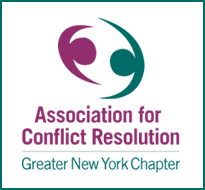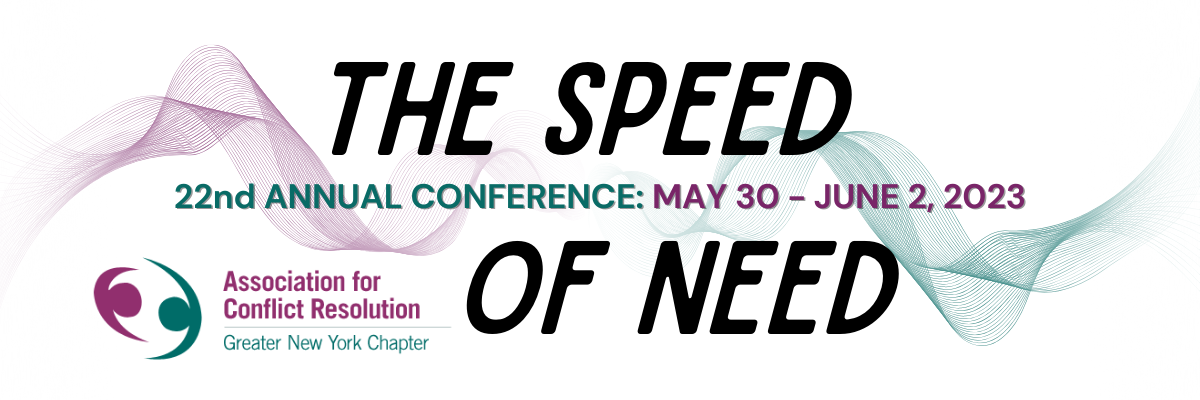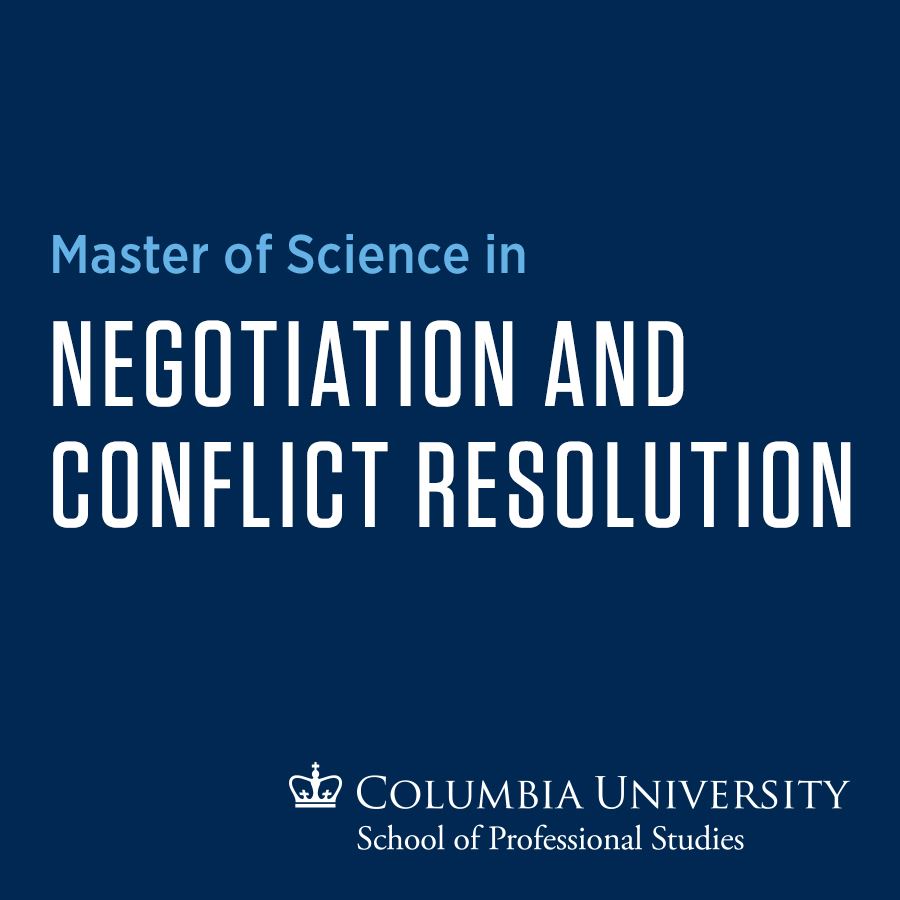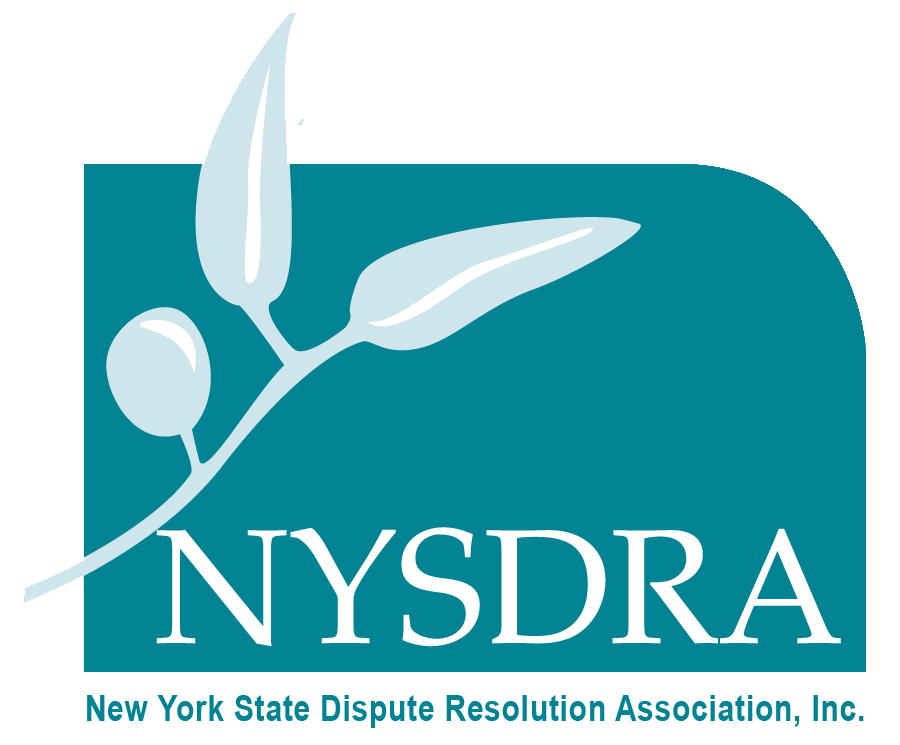|
|
|
CONFERENCE AGENDA
(all times in Eastern Standard Time)
Session tracks
• Commercial ADR (Business, Finance, Securities)
• Interpersonal (Family/Divorce, Restorative Justice, CDRC, Interfaith)
• Organizational/Governmental (Labor/Employment/Workplace, Schools, Co-op/Condo, Ombuds)
• Peacebuilding/CR Process (International, Societal, NGO, Large Scale)
• Dispute Prevention, Negotiation, and Other Resolution Skills
• Other

WELCOME VIDEO MESSAGE FROM ACR-GNY PRESIDENT EMILY SKINNER, PH.D.
SESSION #1 - 9:00am
Green Mediation Apprenticeship Programs: Exploring the Application of Sustainable Practices to Peacemaker Education
Presented by: Courtney Chicvak
As both responses to climate change and building conflict resolution capacity become urgent, time-sensitive issues in society, how can Community Dispute Resolution Centers (CDRCs) respond in a way that develops skilled mediators that deliver quality and inclusive mediation services while also advocating for environmentally conscious practices?
This presentation will outline the core principles of sustainable practices, detail the benefits of incorporating eco-friendly practices into apprenticeship programming, and describe strategies applied to mediation apprenticeship programs at CDRCs, using EAC Network Long Island Dispute Resolution Centers apprenticeship program as an example.
••
Resolving Eviction Cases - An Integrated Approach to Mediation
Presented by: Seth Izen, Li Morrison
Starting in November 2020, MetroWest Mediation began receiving eviction referrals from the District Court at the Case Management Conference. Recognizing that tenants and landlords needed help bridging communication, jointly applying for rental assistance, and connecting with other community resources, we expanded the role of our service to provide support more commonly associated with social work than mediation. Our goal was to do everything necessary to enable landlords and tenants to come to the mediation table as prepared as possible.
The success of this housing mediation program contributed to our home city, Framingham, having the lowest percentage of eviction orders as a percentage of overall Summary Process eviction filings of the 16 cities in Massachusetts of a comparable size.
This presentation will discuss the impact of our program as well as the challenges and opportunities from our expanded role in assisting landlords and tenants before they get to the mediation table. Questions to discuss include: How can we stay neutral while serving in a quasi-advocate or social work role? What does our organization gain from stepping outside of a traditional "mediator" role? Does the success of the program and benefit to community justify the risk of this untraditional focus?
We hope this presentation will help other mediation providers think critically about their role and how they can best assist parties in cases in which support may be needed prior to the mediation.
••
A CONVERSATION WITH SPECIAL ENVOY JESSICA STERN - 10:30am
This event has been postponed. Stay tuned for more information.
Appointed by President Biden, Jessica Stern serves as the Special Envoy to Advance the Human Rights of Lesbian, Gay, Bisexual, Transgender, Queer and Intersex (LGBTQI+) Persons. Special Envoy Stern leads U.S. efforts to protect LGBTQI+ persons globally from violence and discrimination.
Prior to joining the Department of State, Stern led Outright International, a global LGBTQI+ human rights organization, as its Executive Director for ten years. At Outright, Stern helped the organization secure observer status at the United Nations, release human rights reports annually, built the world’s largest COVID LGBTQI+ grant-making program, and quintupled the budget. Before Outright, Stern was a researcher and advocate at Human Rights Watch, Amnesty International, and the Center for Constitutional Rights.
Stern has a long history of multilateral engagement. She was a founding member of the UN LGBTI Core Group and of its secretariat. Stern successfully campaigned for the first UN General Assembly resolution to include gender identity and for successive Human Rights Council resolutions on sexual orientation and gender identity, leading to the establishment of the Independent Expert on Sexual Orientation and Gender Identity. Stern provided the first LGBTQI+ rights expert testimony in a UN Security Council Arria. Stern has frequently served as an advisor to UN mechanisms, including as a founding member of the UNWomen LGBTI Reference Group.
Stern is a published author, is frequently cited in the media, and is the recipient of numerous honors, including from Crain’s New York Business, Gay City News, and the Metropolitan Community Church. As an adjunct associate professor, Special Envoy Stern taught the first LGBTQI+ rights course at Columbia University’s School of International & Public Affairs. Special Envoy Stern has lived in Mexico, the United Kingdom, and Uruguay.
SESSION #3 - 11:45am
Efficiency in Practice - The Implementation of Technology to Add Efficiency and Speed to Your Practice
Presented by: Kristyn Carmichael
For many mediators, it is common to run their practice with limited technology and obsolete systems. As technology expands, so does the ability to track your clients, payments, and practice with ease. This includes the implementation of CRM systems that integrate with payment, calendaring, marketing, and more. This training covers the many options available to the ADR field to expand their practice, making it more efficient and removing administrative actions from the mediator's work load.
••• (Any ADR practice)
SESSION #4 - 12:55pm
R(evolutionary) Organizational Structures
Presented by: Yura Sapi, Christiamilda Correa
Are you tired of traditional organizational structures that leave some members feeling unheard and undervalued? Are you ready to create a truly liberated structure for your community group? Join us for an enlightening session on R(evolutionary) Organizational Structures.
As you look to create a more liberated structure for your community group, we offer a comprehensive exploration of biomimicry and nature as our teacher, welcoming feedback processes, and liberated decision-making strategies that prioritize collective liberation.
Through a combination of healing arts, writing, meditation, and visualization exercises, you will discover new ways of engaging with your community, working together, and sharing responsibilities. Our expert facilitators will guide you through the process of designing a truly liberated organizational structure for your group.
Join us to gain the knowledge and skills necessary to transform the way your community functions. Be a part of the movement towards a more equitable and just society.
•••• (Decolonizing, meditation, healing, art therapy)
Overcoming Avoidance of Diversity Changes in Dispute Resolution: Tools for Change
Presented by: Dan Berstein
The Mental Health Safe Project's advocacy has led to major updates to dispute resolution guidance so practitioners do not inadvertently discriminate against people with mental illnesses and disabilities (ex. discriminatory screening, illegal inquiries, or disparate treatment). Yet even dispute resolvers can be conflict-averse, and achieving these updates was sometimes challenging when people were reticent to engage. This workshop reviews research about six types of avoidance - big-tenting, isolating, abnormalizing, stonewalling, evading, and distracting - and applies them to real case studies of positive changes. Learn a method of honoring the avoider's self-determination while providing objective reflections of their boundaries, as well as clear next steps to move forward and make important diversity changes that transcend resistance. Receive tools designed to help avoiders and advocates alike de-escalate and forge peaceful progress.
•••••
SESSION #6 - 3:00pm
Toxic Culture, Retention and Third-Party Intervention
Presented by: Ed Watt
The Covid pandemic has precipitated the Great Resignation and pulled back the curtain to reveal a perfect storm. Many occupations, now considered essential, have borne the brunt of dysfunctional culture and physical and psychological stressors.
According to research, incivility, harassment, bullying, and other toxic interactions can result in absenteeism, presenteeism, turnover, and other behaviors that negatively affect an organization's core mission and bottom line.
Research on workplace turnover shows that dysfunctional culture can be invisible and ubiquitous. Curing dysfunctional interaction with a transformative approach to workplace culture is cost-effective, people-friendly, and the right thing to do.
Culture change has been mentioned in workforce literature for twenty or more years. However, the ability to implement that change has been elusive. Addressing dignity in the workplace may be the missing element in the search for workforce retention tools. We look at third-party intervention in the US Postal System and the National Institutes of Health as examples of culture-reforming systems. Instituting a conflict resolution system that recognizes and honors the individual's dignity and agency will improve employee retention and performance and have collateral benefits in areas such as customer service. Adopting a program of transformative mediation is the next step in the evolution of conflict interaction.
•
IN-PERSON EVENT AT JOHN JAY COLLEGE - 6:00pm
Navigating Uncertain Futures at the Speed of Need: A Conversation
Location: John Jay College of Criminal Justice
(899 Tenth Avenue, New York, NY - Haaren Hall, Room 630)
Join us at John Jay College of Criminal Justice for Navigating Uncertain Futures at the Speed of Need, featuring special guests Zaynab Abdi, Borislava Manojlovic, and Shai Naides and moderated by Nick Pozek. This is an opportunity to reconnect with colleagues from ACR-GNY and the Roundtable Breakfasts in an evening event!
The central discussion of this event considers the polycrisis - the convergence of seemingly intractable and potentially existential risks defining the 21st century. Through topics such as the myriad of humanitarian crises, the rise of AI, the climate emergency, and deepening political polarization, this conversation will explore the emerging issues that conflict resolvers face today and the competencies needed to address them.
We are looking forward to an evening of conversation and connection. Light refreshments will be served. We hope you will join us!
*This event requires separate registration. Please register here!*
CO-SPONSORED BY:
CUNY Dispute Resolution Center at John Jay College
Association for Conflict Resolution - Greater New York Chapter (ACR-GNY)

SPONSORED BY
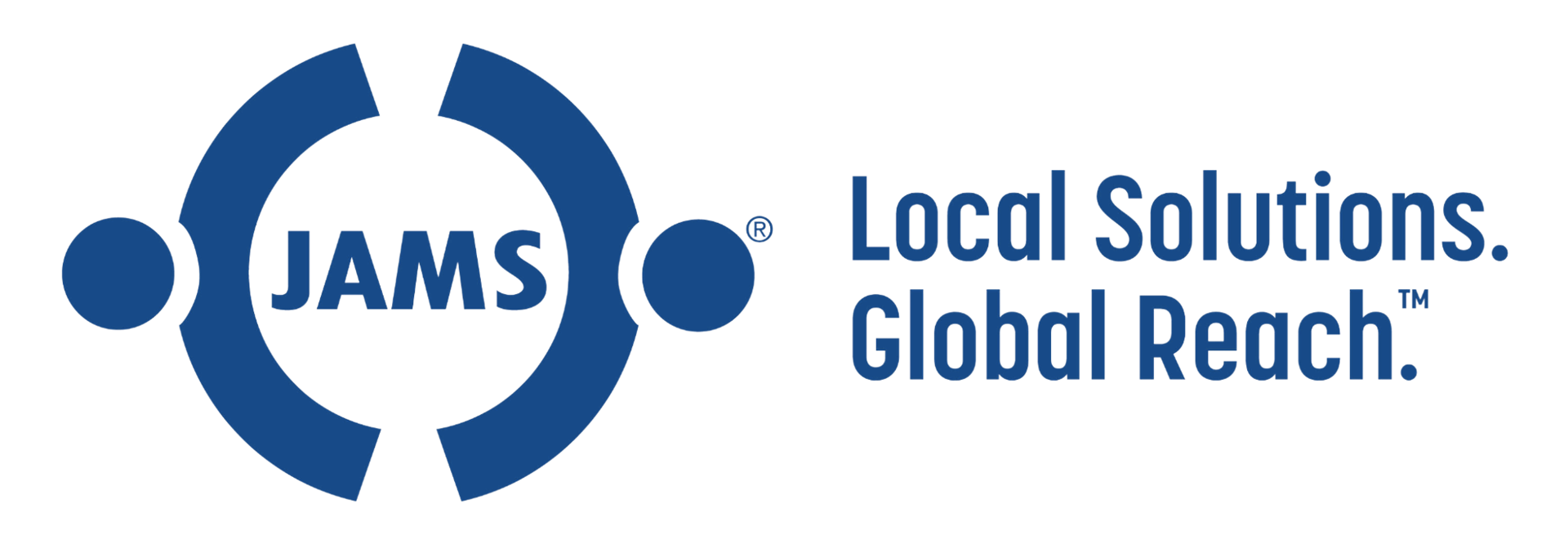
SESSION #7 - 9:00am
Disrupting Eviction: Radical Neutrality Advocacy and 21st Century Access to Justice
Presented by: Roger Moss, Carole Conn, Esmail Rahimian
The pandemic broke down resistance to new technologies that speed and enhance delivery of professional neutral services. However, it is "thinking different" that generates transformational change in effective conflict engagement.
Join us for an interactive conversation that examines the advent of rapid response, compassion-centered, interdisciplinary dispute resolution through the lens of Conflict Intervention Service (CIS), a groundbreaking program that stabilizes housing and prevents dislocation of vulnerable people and small businesses.
Help us explore these topics and questions:
- Rapid response: the magic weapon
- Connection: lead with love
- Who says mediators can't drive solutions?
- Are you a shapeshifter?
- Portable neutrality: Going to the conflict
- Have you banished “intake” from your mind and org?
- Small conversation and asynchronous negotiation
- Tech, ODR, vulnerable populations, myth, and stigma
- Meditate and mediate
- Are you a joyful neutral warrior?
•••
SESSION #8 - 9:55am
The Evolution of Leadership and the Workplace
Presented by: Dr. Robyn Short
We are living in an era of unprecedented change and disruption. From disruptions associated with climate change to political and civil disruptions to the disruptions brought on by a rapidly evolving workforce, volatility, uncertainty, complexity, and ambiguity (VUCA) are the new norm. To lead in a VUCA environment, leadership must evolve to meet the needs of an evolving workplace. Today’s leader must be proficient in the dynamics of human behavior — shifting from a traditional approach leadership to a more human-centric model of leadership. In this presentation, Dr. Robyn Short, founder and CEO of Workplace Peace Institute, will present new skills and competencies leaders must adopt to meet the demands of a modern workforce.
Participants will learn:
1. How to center basic human needs and dignity needs in a leadership approach
2. Core competencies for leading in this era of volatility, uncertainty, complexity, and ambiguity (VUCA)
3. How conflict engagers can take the lead in creating a human-centric culture
Dr. Short engages audiences with multidisciplinary research, effective strategies for growing as leaders in a modern workplace, and storytelling. Her friendly, down-to-earth approach allows participants to lean into the subject matter and learn from a place of joy and connection.
•
SESSION #9 - 10:50am
Pace and Confluence: Exploring the Role of Nature in Peacemaking
Presented by: Dr. Jennifer J. Wilhoit
This workshop addresses the inquiry: how can we meet urgency and crises in conflict resolution with a pace that honors unfolding process, wellness, and greater interconnectedness for our clients and ourselves? By looking to the natural world's rhythms (paces) and patterns (confluences), we can learn more effective, sustainable response to conflict. After a brief overview of relevant ecological concepts, we will turn our attention to understanding their value in human contexts – particularly, life transitions, crisis, and seemingly impassable conflict.
We will explore how these concepts relate to and are applicable to speed and deliberation in our peacemaking work. This interactive presentation will offer conflict resolution professionals:
- - Examples and values of key ecological concepts
- - A means for translating the language of ecology into useful concepts in conflict resolution
- - A vision for how we can apply these concepts - pace and confluences in nature - to our conflict resolution practice
Through guided activities, reflection, breakout groups, brief case study samples, and large-group discussion, attendees will have opportunities to see the specific ways in which the natural world's various paces can invigorate and expand their work. Participants should bring with them to this session: journal, pens, and at least one meaningful nature object.
••
Workplace Culture and the Role of the Ombuds
Presented by: Kira Nurieli
Many organizations are becoming aware of how a negative workplace culture leads to conflict and low morale. The Organizational Ombuds can be a helpful role in shifting to a more positive, productive professional atmosphere. But how does this happen and what leads to the changes? This program will provide an overview of how an Ombuds relates to workplace culture, including exploration of common standards of practice (confidentiality, neutrality, independence, and informality) and opportunities within this role.
•••
SESSION #11 - 1:40pm
The Role of Technology in Mediation: Understanding Attitudes and Practices among Mediators
Presented by: Mnotho Ngcobo - ABA Research Fellow (with Gary Doernhoefer)
This session will explore the use of technology in mediation and the attitudes of mediators toward it. Conducted by the American Bar Association, Section on Dispute Resolution, the session will present the findings of a research study that surveyed mediators across the United States on their use of technology in mediation, their attitudes towards technology, and the impact of technology on the mediation process.
The session will begin with an overview of the study methodology and highlight the key findings of the study, including the prevalence of technology use among mediators, their attitudes towards technology, and the impact of technology on the mediation process. The presentation will also discuss the implications of the study findings for the practice of mediation.
The session will conclude with a Q&A period, allowing participants to ask questions and share their own experiences and insights on the role of technology in mediation.
•• (Technology in ADR)
Conflict Coaching for Systems Conflicts
Presented by: Tricia Jones
Conflict coaching has a rich tradition in New York and, as a result, is being used by private coaches, organizations and community mediation centers to address a number of conflicts. Increasingly, parties coming to conflict coaching are dealing with systems conflicts more than or instead of interpersonal or group conflicts. Systems conflicts are the struggles we have navigating and negotiating with systems of service (for example, education, housing, health care) systems of restriction (for example, legal or juvenile justice) and systems of occupation (for example, our own workplace). Conflict coaching offers support for parties who are experiencing or plan to experience systems conflicts and can be important as a pre-mediation, pre-facilitation or pre-arbitration conflict analysis and strategic planning conversation. This session discusses the nature of systems conflicts and five key conflict coaching conversations (knowing the system, building a community, de-escalating systems tension, building a bridge, and designing BATNAs for systems conflicts). The session is interactive and engages the wisdom of the group in elaborating on the core coaching conversations presented.
•••
SESSION #13 - 3:40pm
Challenges in Parenting Plans: Interventions from Dispute Resolution Professionals
Presented by: Alexia Georgakopoulos, Ph.D., Lizyvette Ramos, Ph.D.(c), Toran Hansen, Ph.D.
Challenges in Parenting Plans: Interventions from Dispute Resolution Professionals. This presentation will cover critical topics such as Parenting Plans and Co-parenting. The definitions and consequences of Domestic Violence and Interpersonal Violence will be discussed. Concerns related to Substance Abuse and Child Abuse will be explained. Relevant issues such as Asymmetrical Power, Screening, Safety Concerns & Safety Plans, and Children's Safety & Best Interest will be described. Crucial concepts will be clarified, including Reporting, Vulnerability, Emotions & Feelings, Unhealthy Relationships, Traumatic Experiences, Resources and Services, Communication, and Shuttle Diplomacy. Furthermore, the roles of Humanistic Mediation, Human Interconnectedness, Reconciliation, Peacebuilding, Peacekeeping, and Transformation will be illustrated.
•••
Robot Mediators, Avatars, and AI: A Reality Check on the Speed of Current and Future Dispute Resolution Technology
Presented by: Paula Plaza - ABA Research Fellow (with Gary Doernhoefer)
Artificial intelligence has exploded into our everyday lives. This session is a reality check on the successful incorporation of legal technology and tools in mediation with a look at the potential future of AI and human mediators. Presenters will detail ways in which technology can support practitioners whether conducting in-person and online mediation, and describe current cutting-edge applications including ChatGPT, AI judges in Estonia, and robot mediators in Canada. It will conclude with an evaluation of the future potential of technology in mediation considering both issues and opportunities.
••

ROUNDTABLE BREAKFAST DISCUSSION (VIRTUAL) - 8:00am
(Co-presented by CUNY Dispute Resolution Center at John Jay College & ACR-GNY)
Mediation "At Scale": The story of the near-collapse of the largest Tribal-Federal negotiations in a generation
Presented by: Joshua Flax
In 2016, the US Department of Transportation initiated mission-critical negotiations with a body of tribal negotiators representing all 574 federally recognized tribes in the country to fund roadbuilding and safety measure construction across Indian country. This case study examines the mediation that rescued these negotiations from collapse and highlights some of the "adaptive mediation" (Dr. Peter Coleman et al, Columbia University) moves the mediation team used to turn these negotiations away from disaster and ultimately to success.
*This event is FREE to attend but requires a separate registration. Register for the Roundtable Breakfast Discussion here.
SESSION #15 - 10:10am
Time Dynamics in Mediation: Effects and Mitigation
Presented by: Damian Priamurskiy, Caroline Ewing
Moderated by: Onawa Gigliotti
Time can play a very strong role in mediation, in mediators' decision making, in creating bias, and in outcomes. In this presentation you will hear about a mediation that brought this topic to the fore. We will discuss research about the effects of time pressure on decision making using real life examples that illustrate how quickly and unconsciously decisions are weighed and made. We will cover such cognitive biases as the halo effect, sway, and framing bias. We will share several ways to mitigate these negative effects including strategies from global industries. We will discuss how mediators can stay alert to these oncoming conditions. We will conclude by sharing proposed approaches to staying ahead of these conditions and steadying the mediation process. We look forward to a lively discussion with the participants about their experiences with time pressure in mediation and how they have addressed this. We can then work together as a group to develop a sample list of mitigation strategies that we can use when faced with time pressure in our future practice.
•
SESSION #16 - 11:20am
Use of Mediation and Facilitation for The Speed of Need in Implementing Climate Resilience and Adaptation
1.5 CLE Credits (Law Practice Management)
Presented by: Christopher Kane, P.E., J.D., Lara Fowler, Joseph A. Siegel, J.D., Liliana Pimentel
The impacts of climate change increasingly are causing more severe storms that are compounded by sea level rise. The result is more flood and storm surge damage events such as storm surge damage from Superstorm Sandy, flooding in the Mississippi Valley, and Chesapeake Bay contamination from stormwater runoff. Implementing solutions to these crises are hampered by many conflicting interests, funding challenges and decades-long project implementation. Effective conflict avoidance and early resolutions can improve the path to more swiftly reach sustainable solutions and avoid additional losses. The speed of need can benefit from more structured and effective processes using skilled neutrals.
The Panel will present an overview and background of some examples of storm-related catastrophes and offer lessons-learned on how ineffective conflict management in multi-stakeholder efforts to address the climate crisis, can put parties on the slow road to recovery. The panel will also discuss how mediators and facilitators can help to speed those efforts and enhance outcomes by using some best practices in community engagement and collaborative governance. They will describe how these tools offer an opportunity to help parties to form partnerships, build broad-based support and implement creative long-term solutions on a much quicker timeline.
•••• (Mediation and Community Engagement)
SESSION #17 - 12:45pm
Deaf Mediations & Hard-of-hearing Mediators
0.5 CLE Credits (Ethics and Professionalism)
Presented by: Jess Kent, Dr. Elizabeth (Liz) S. Kent, Esq.
Join a Buffalo-based mother-daughter mediator duo for a dynamic discussion covering 2 topics: best practices for mediations with 1) language translation services and 2) hearing impaired parties. How does the ability/disability spectrum and language fluency affect power imbalances between parties in mediation? This interactive presentation requires active participation and will conclude with Q&A to swap best practices. Come for the comedy, stay for the skills! As the field of mediation grows, and more diversity is reflected by the parties, our professional abilities must expand too: How do we select an interpreter in preparation for a successful mediation? How can a mediator communicate effectively with clients who require a translator, or for whom a translator is unavailable? According to the American Community Survey, Buffalo currently houses 22,000+ foreign-born residents whose first language is not English. Additionally, according to the 2021 National Institute of Health Study, 3/1,000 US-born children have a detectable level of hearing loss in one or both ears. More than 90% of deaf children are born to hearing parents and approximately 15% of American adults (37.5 million) over the age of 18 report significant hearing loss that affects their ability to communicate effectively. What are the best practices for mediating as a hearing impaired mediator? What are the tips to mediate with a party who has a hearing loss?
••
SESSION #18 - 1:40pm
Conflict Management Strategies in Virtual Teams
Presented by: Yeju "Chloe" Choi
The outbreak of the COVID-19 pandemic has changed the way organizations and teams operate. According to the Bureau of Labor Statics, 35% of employees worked remotely in 2020 during the peak of COVID-19. People tend to face more challenges in managing conflict in a virtual team environment (Caputo et al., 2018). Despite the rapid increasing need, there is a lack of understanding in conflict and its management in virtual teams. Based on the literature review and the findings of a recent study of 223 surveys and 23 semi-structured interviews, this session will discuss (1) how conflict manifests and often dealt with in virtual environments and (2) share the conflict prevention and management strategies for virtual teams. This session will be helpful for organizations and professionals in dealing with challenges to virtual team collaboration and recommended organizations to train their leaders with the list of behaviors that this study found to be helpful to reduce the challenges.
••
TRUE COLORS: INTERACTIVE MEMBERSHIP SESSION - 2:50pm
Getting to the Heart of Enhanced Collaboration and an Engaged Membership
Facilitated by: Dawne Mitchell and ACR-GNY Vice President of Membership Ingrid Scholze
As a member organization and a professional community ACR-GNY seeks partnership and collaboration of its membership to advance its goals and objectives. Knowing how we show up as our true selves is key information as to how we show up as a contributor on a team, committee, and or in a collaborative process. This workshop will aim to give participants insight into how they approach problem solving, what they believe they need to feel effective, and how they can best work with others who think and strategize differently. With this newly discovered knowledge, the membership committee will then aim to elicit feedback on what steps ACR-GNY can take to further engage its existing membership and incentivize new membership.
True Colors Activity: True Colors is a self-assessment tool that engages participants in self-discovery as it relates to effective teaming. One way to achieve the most optimal experience in working with others is to be self-aware of your own skills, blind spots, and strengths. This exercise is a fun and interactive opportunity for professionals to engage in hearty discussions and discovery while identifying the styles of others on the team and maximize the ability to work with others. This exercise will lead to one of the best strategies to build effective collaborations and engagement.
*This event is designed for ACR-GNY members and prospective members but all are welcome. Become a member today!*
SESSION #19 - 4:30pm
The Speed of Need Before, During, and Beyond Prison
Presented by: Trudy K. Junkroski, Abdul Shakur, Ney McCain, Ryan Moser
Community members who have spent a significant portion of their lives in prison hold wisdom and stories that yearn to be shared. This presentation provides a glimpse of the stories of several extraordinary men who have lived through decades of incarceration, identifying the needs that were present in their lives before, during, and after prison. The opportunity to tell, to hear, and to engage with their stories elevates our understanding of one another's humanity and the ways in which we can be a restorative presence in the world.
•••• (Incarcerated Citizens; Re-Entry)

SESSION #20 - 9:00am
Creative Response to International Restorative Circle Practices
Presented by: Tara Fishler, Priscilla Prutzman
Learn how to apply restorative practices with an international community! After Creative Response to Conflict led a workshop at a peace education conference in India on restorative practices, participants wanted to continue learning, so we created a virtual circle which began our International Restorative Circles (IRC) group. This revolving group has continued to meet monthly for over three years, exploring and experiencing challenges and solutions for integrating restorative practices into many fields and communities. Join us to learn about the IRC and experience our virtual circle process. Come away with some advanced techniques to conduct restorative circles in person and virtually, including tips to discuss difficult topics.
••••
SESSION #21 - 10:10am
How to use self-awareness of our speed as conflict professionals to help our clients
Presented by: Michelle Exline Minovi, Hansa Patel
Learn to increase your capacity as conflict professionals by developing self-awareness of your speed, i.e., your inner reactions and judgments to parties that may interfere with understanding the parties and the conflict resolution process. Throughout this session, we will work on the following learning objectives:
1. Practice deepening understanding of self
2. Gain further insights into the relationship between inner and outer self as a conflict professional
3. Recognize and minimize the impact of judging parties
4. Begin to notice your own speed and how to intentionally use speed as a tool in mediation.
•• (Appropriate for multiple disciplines of conflict resolution)
SESSION #22 - 11:20am
The Intersection of Emotional Intelligence and Speed in Conflict Resolution
Presented by: Marsha Hilton
This session will explore the crucial role of emotional intelligence in conflict resolution. Through this session, attendees will learn how emotional intelligence can be used to increase the speed and effectiveness of conflict resolution, without sacrificing the integrity of the process. The session will focus on practical strategies for leveraging emotional intelligence to build rapport with clients and move towards resolution more quickly.
Attendees will leave this session with a better understanding of how emotional intelligence can be harnessed to achieve better outcomes in conflict resolution. They will gain insights into the benefits of building strong relationships with clients and how emotional intelligence can be used to navigate complex and emotionally charged conflicts more effectively. The session will also touch on the importance of maintaining ethical standards and building trust with clients, even when operating at a faster pace.
This session is ideal for practitioners, academics, and anyone interested in improving their conflict resolution skills. By attending this session, attendees will gain valuable insights into the intersection of emotional intelligence and speed in conflict resolution, and walk away with practical strategies for applying these concepts in their work.
••••
SESSION #23 - 12:30pm
The urgent need for family estrangement conflict interventions: Results from a national survey
Presented by: Lisa M. PytlikZillig, Ashley M. Votruba, Kristen Blankley
Throughout an individual's lifespan, their family may provide emotional, social, and financial support. However, such support is hindered by family estrangements, which involve conflict-driven loss of contact among adult family members such as parents/adult children, siblings, or extended family members. Prior studies estimate such estrangements may directly implicate 25% or more of the adult population and impact many others. At the same time, almost no interventions exist specifically to address the unique conflicts underlying adult family estrangements. Furthermore, little research has focused on the impacts of such estrangements and whether and how people might like to be assisted when they are affected by estrangements. In a U.S. nationwide representative (by gender, race, and age) survey of approximately 1000 adults, we assessed the prevalence of self-reported estrangements, the reported impacts of such estrangements, and other characteristics such as whether and how estrangements intersected with the legal system. Further, we will describe the extent to which respondents indicated a desire for help with family estrangement situations, the sorts of help they prefer, and how these preferences relate to trust in different institutions. We argue our results show an urgent need for the development of resources and interventions specific to conflicts underlying family estrangement.
•
SESSION #24 - 1:30pm
Navigating Cultural Differences in Communication: Strategies for Resolving Conflict in Collectivistic and Individualistic Societies
Presented by: Suzzette Harriott
This presentation is designed to provide attendees with a comprehensive understanding of the key differences in communication styles between collectivistic and individualistic societies, with a specific focus on how these differences can impact conflict resolution processes. Through an exploration of cultural values, norms, and expectations that shape communication patterns, attendees will gain practical strategies for navigating these differences to achieve more effective and equitable outcomes in conflict resolution.
In order to facilitate a deeper understanding of these concepts, the presentation will utilize interactive exercises and case studies, which will provide attendees with a real-world understanding of how cultural biases and stereotypes can impede effective communication and conflict resolution. Additionally, we will discuss the importance of building cultural competence and self-awareness in conflict resolution processes, and how to achieve this through ongoing training and education.
By the end of this presentation, attendees will have gained valuable insights into the role of culture in conflict resolution, and developed practical skills and strategies for working effectively with individuals from diverse cultural backgrounds. This session is relevant for conflict resolution practitioners working in a variety of contexts, including community-based organizations, international organizations, and businesses operating in global markets, as well as for anyone seeking to gain a deeper understanding of cultural differences in communication.
•••••
SESSION #25 - 2:10pm
Levels of Listening: Skills to Move Difficult Conversations Forward
Presented by: Betty Chan
We all experience it – being in a conversation where we don't feel heard. This creates resistance. We stop being open to new ideas and feedback crucial to our everyday interactions and personal growth. Over time it can lead to burnout and disengagement even from the most dedicated. Together we will explore your natural listening level and practice moving between them.
Participants will:
• Learn the distinctions between the three levels of listening and when to use them
• Take turns practicing the levels and reflecting with a partner on the impact of each
• Practice being out loud about your bias and judgments in a low-risk environment
••••
SESSION #26 - 3:35pm
Peer Mediation among Refugee Communities: A Path to Self-efficiency and Sustainable Conflict Prevention
Presented by: Helen Winter
This webinar will explore the link between peer mediation and self-efficacy of refugee populations. The charitable organization R3SOLUTE has successfully implemented peer mediation mechanisms in refugee shelters in Germany over the past 5 years. Those who are trained as peer mediators find meaning and a purpose in their new role as peace makers, and are also those who move out of the refugee shelter and find a job. In her research, Helen Winter has examined and outlined the link between peer mediation and self-efficacy of marginalized communities such as refugees. In this webinar she will address the challenges and best practices of her peer mediation program with refugees in Germany, as well as address the need for systemic change and policies encouraging agency of refugee populations through ADR.
••
